- Home
- Will McIntosh
Faller Page 17
Faller Read online
Page 17
When he’d finished reminiscing, Faller dragged the bed under the open window. Lying on his back with his hands propping his head, he gazed out at the bright swirl of stars as a cool breeze washed over him. He wondered how many worlds were out there, seeding that endless sky.
He withdrew the map from his pocket, counted the ovals. According to his map, there were seven. Maybe there were seven, but if there were a thousand, he wouldn’t have had enough paper, or blood, to draw them all, so the map might not be representative. For all he knew there were a million worlds.
Were there more worlds to the sides as well as below? Maybe more importantly, was there anyone out there who could tell him why things seemed to have started in the middle, why the worlds were peppered with the same people? Someone, somewhere must have answers. Faller stared at the X over the bottom world. He was betting the answers were down there.
XIII
THEY STARED at the TV mounted on the factory wall in disbelief. On MSNBC, soldiers were swarming up Market Street in San Francisco. Foreign soldiers—Russian, Venezuelan, maybe North Korean farther down the coast. Foreign soldiers were invading. Russian T-90 tanks were on the beach in Santa Monica, firing on U.S. positions in the city.
Peter felt a hand on his shoulder, turned to find Harry beside him, stone-faced. “I think we have to bring more people into the fold. We need to move faster.”
“The power stations are going to be the holdup.” They had two hundred engineers working on the nanostructured fuel cells, three entire factories in the process of being converted to produce the cells. None of those employees knew why they were designing what they were designing, building what they were building.
“Then we need to put more people on that end of it.”
It had never occurred to Peter that the Western Alliance might lose. Peter hadn’t wanted either side to win; he wanted it to end in a draw, the war called on account of pointlessness.
“You’re right.” He squeezed his temples, trying to banish the relentless headache. It was always with him. No wonder, given how little sleep he was getting. His eyelids, his fingers were twitching with exhaustion.
“I’ve got to get back to work.” Peter turned toward the station set up in the corner, stumbled, dropped to his knees. A loud buzzing hit his ears as his vision went dark.
“Peter?”
“Yeah. I’m all right.” Peter struggled to his hands and knees. He’d fainted. He hadn’t even realized he’d lost consciousness; it had come over him like a wave.
He felt a hand grasp him under the arm. “Take it easy. Sit. Just sit.”
The feet and legs of his colleagues were all around him as he sat on the floor, still woozy.
“Call an ambulance,” Harry said to someone.
“No. A trip to the emergency room will eat half a day. It’s just fatigue.”
“Peter, you just passed out. We’ve got to get you looked at.”
Peter took a deep breath, trying to clear his head. It was pounding, and he had chills rushing through him that felt like an electric current. “What do we have, three M.D.s on the payroll? Get one of them down here.”
* * *
TEN MINUTES earlier, he’d silently vowed to rest for five more minutes, then get back to work. There seemed to be extra gravity holding him down, pressing him into the cot. It was an effort to lift his arm to reach for the water Dr. Otero had left for him. He had a headache in two distinct places—behind his eyes, and in the back on the left side of his head. No one could do his work for him, though. Maybe he should give in, sleep for six or seven hours.
Dr. Otero came in carrying a printout, likely the results of the blood test. She was wearing a mask. She hadn’t worn a mask during the examination.
“Dr. Sandoval.” She paused. She looked deadly serious.
Potential diseases ran through Peter’s head: cancer, ALS—
“You’ve contracted the Peterson-Jantz prion.” She dropped her gaze. “I’m so sorry.”
It felt as if the cot had been pulled out from beneath him, and he was falling. He was sure he was about to lose consciousness again. Maybe he had lost consciousness and was imagining this whole scenario?
He’d taken every precaution, should have had a zero percent chance of contracting the disease. It could only be passed through fluid—blood, semen, saliva. There was always room for error, wasn’t there?
He had a month, at most. Most of it would not be quality time. A memory of Izabella, twitching, raced through his head like a spider scrabbling down his spine.
The terror—the black, sinking terror really kicked in, doubling him over, making his vision swim and his head spin. He was going to die.
“Do you want me to inform anyone for you?” Otero asked.
“No. Don’t tell anyone.” He needed to finish the project before he died. Did he have enough time?
No.
“You need to be hospitalized, under quarantine.”
“I’ll check myself in.” He looked up at Otero, beseeching. “I’ve been carrying it unknowingly for days. If I were going to infect anyone, it wouldn’t be now that I’m aware I have it. At least now I know not to share an ice-cream cone with anyone.”
Dr. Otero nodded. “I’ll leave you to rest and check on you in a few hours.”
“Thanks.”
As Otero’s footsteps faded, Peter could hear work going on in the lab. He didn’t see how they’d be able to finish the project without him. They’d have to turn it over to the federal government, who would undoubtedly try to turn the singularity into a weapon.
Maybe the diagnosis was a false positive; there must be cases where they misdiagnosed—
Peter laughed out loud. Here we go: denial—the first stage in Kübler-Ross’s stages of dying. Next he’d start bargaining, although with whom, he had no idea. Maybe he could bargain with Ugo. If you’ll resume your work on Peterson-Jantz, find a way to isolate the prion-binding properties without the side effect of the complete obliteration of my memory, I’ll— He’d what? Bring Izabella back?
Ugo despised him. Maybe Ugo had a right to despise him.
His thoughts kept turning back to Izabella. She’d asked him to try to imagine what it felt like to be dying. He’d done his best; now he knew his imaginings were a pale shadow of what it actually felt like. You simply couldn’t imagine what it felt like until someone was standing in front of you, holding your test results.
And now that he felt the full weight of dying, Izabella’s desire to be duplicated made perfect sense.
He could do it, now that he knew he had to be unconscious when he went through. He could do it, if he wanted to.
He was so close to tapping the power of the singularity, to ending the war before it consumed the planet.
What about Melissa? If he did this, would the new Peter simply pick up where the old Peter left off, when the old Peter died? Did they start again from the beginning?
Was he really considering this?
Considering, yes.
Ugo would despise Peter even more, if Peter succeeded in duplicating himself after failing with Izabella.
Would anyone understand? Would his duplicate be allowed to carry on, to inherit Peter’s lab, his grants? Or would he be whisked off to some CIA lab for study?
He’d have to do it secretly, in the middle of the night. Just like with Izabella.
27
AS SOON as the sun rose, Faller wanted to find Storm, but that would seem needy and pathetic. He might well be needy and pathetic, but he didn’t want to seem that way to Storm.
Instead, he took out the photo. It was badly worn around the edges, the corners rounded, but Storm’s smiling face was still crystal clear …
Then it dawned on him. Maybe Susanna and Emily’s attire—the country dresses, their hair in identical yellow bows—had thrown him, because it was so different from the black blouse and jeans the Storm in his photo was wearing. Storm must have also realized by now that she might not be the woman in the photo.
Maybe that was why she’d chosen to go with her twins, rather than stick with Faller.
He didn’t want to believe either Susanna or Emily was the woman in the photo. They might look like Storm, but there was something about Storm, a feeling he got when he was around her, that told him she was the one he’d once loved.
The one he still loved. He felt sure his feelings for her had come through Day One intact, even if it had stripped away everything else. How else could he explain the love he felt for this woman? He’d felt it from the moment he’d met her.
She was beautiful, yes. But so was Orchid, so were a lot of women. They didn’t make his stomach feel like he was falling when he was standing on solid ground. Only Storm did.
Despite the heaviness of her absence, Faller decided it was best to give her time, to let her come find him when she was ready.
In the meantime he helped Snakebite in any small way he could, holding two broken ends of an ax together while Snakebite set screws, finishing the stitching on a shoe once Snakebite had the pattern started. The first few times Faller tried to make conversation, Snakebite only grunted, or nodded. When Faller persisted, Snakebite stopped what he was doing and glared at Faller.
“Pay attention.”
From then on the only time either of them spoke was to say something necessary, like, “Hand me that hammer.”
Around midday they were working on a bicycle. The chain had snapped off, and Snakebite was replacing it with one he’d taken from a bike with no wheels propped in a corner of the store.
“One day there’ll be no more spare parts, and then there’ll be no more bicycles,” Snakebite said as he threaded the chain through while Faller slowly rotated a pedal.
“It’s safer to walk anyway,” Faller said. “My friend Stripe hit an open manhole riding a bike and lost his front teeth.”
Snakebite nodded. “Maybe you’re right.”
Faller watched carefully to see how Snakebite linked the two ends of the chain together to create a loop.
“What does it feel like, to fall?” Snakebite asked, keeping his eyes on his work.
The question took Faller by surprise. “At first it’s bad. It feels like your heart is going to explode, like your stomach is falling faster than the rest of you. After a while it’s almost peaceful, like you’re not falling at all.”
Snakebite wiped sweat from his forehead with the back of his wrist. “Do you twist and turn in the wind?”
“You can stabilize yourself by moving your arms and legs.” He’d forgotten how difficult it was to imagine what it was like to fall.
Snakebite gave the pedal a trial spin; the bike’s back wheel clicked smoothly along. Unlocking the bike from the vise, Snakebite flipped it effortlessly to the floor and, clutching the handlebars, pushed it toward Faller. “Would you deliver this to the owner? You can walk it; it’s not far.”
Faller smiled. “Sure. Where do I go?”
“It belongs to Bruce’s wife.” He pointed toward the street. “A few blocks past the Council Hall, big yellow house on the left. You’ll see it.”
Snakebite held the front door open for him. As Faller looked at him and nodded thanks, Snakebite kept his face even, betraying nothing, but Snakebite had to realize the opportunity he was giving Faller with this errand.
Wheeling the bike down the main street, Faller passed a man sitting on the bumper of a red car, eating an onion right out in the open, where anyone could run by and snatch it from him. Such an odd place.
There was a silver figure of a running horse set in the center of the car’s grill. Faller wondered how these people could have cars lining the street, even sit on them, yet never talk about where they came from. Maybe they got it out of their systems late at night in bed, whispering their questions to their lovers.
The doors to the shop he’d passed on the way into town were still open. He slowed, peered in. There were three people in the shop—one behind the counter, the other two looking at things on the shelves and laid out on the floor. They weren’t talking to each other. On his world people talked pretty much nonstop. Maybe it was a side effect of not being allowed to talk about Day One—they didn’t look back, and if you didn’t look back there wasn’t much reason to talk except to ask someone to pass you a hammer, or to ask why you’ve never seen them before in your life.
Faller passed the Council Hall as the road sloped downhill. He spotted Bruce’s house, a grand affair with mown grass and not one broken window.
As he turned the nose of the bike up the driveway the front door burst open and Bruce surged out. He stopped short a few paces off the porch, retreated back inside and reappeared clutching a tire iron.
“You’re not welcome here. Not ever,” Bruce said as he approached.
“You’ve never seen me before, you don’t know anything about me, but you’re out of your house with a tire iron when I show up with your bicycle?” He liked this world; it was softer than his, and way softer than Storm’s. Old men thought they could threaten younger ones with a metal stick. “Come on, cut the shit. How do you know me?”
Bruce’s Adam’s apple bobbed. “I don’t know you, but I know your type. You’ll ruin this place if someone doesn’t stop you.”
Faller noticed movement, saw Orchid’s doppelgänger watching from an upstairs window. He decided he liked the word doppelgänger. As far as he remembered, it was the first time he’d ever thought it.
“My type. You nearly jumped out of your shoes because you turned and saw me and recognized … my type.” He let the words drip with sarcasm.
“I got a charley horse,” Bruce said. “I turned wrong. It had nothing to do with you.”
Faller could see he wasn’t going to get anything useful from this man. He kicked open the kickstand on the bike and turned away without a word. On Faller’s world it was a dire insult to turn your back on a man holding a weapon. Faller hoped it was on this world as well.
XIV
PETER SET the head of the hazard suit down and turned away.
He resisted the urge to double-check the doors to the lab. They were locked. He knew they were. Instead, he pulled off his sweatshirt, his hands trembling from exhaustion, and his illness, dropped his pants and underpants and stepped out of them, set them in a crumpled heap on his desk next to the handgun.
Steadying himself on the desk, he took a deep, whooshing breath, trying to muster the energy to do this.
The worst part was not getting to say good-bye to Melissa, but he couldn’t imagine her going along with this plan, and it was the only plan that made sense. Too many lives were at stake.
The rungs of the short steel ladder were cold on the soles of his bare feet. He felt like a prisoner climbing a gallows.
Stepping into the steel cage with the trapdoor floor he’d rigged, he stared down at the iris, so like a giant eye staring up at him. Now that he was above that hole, he wondered if he really had the nerve to inject the methohexital and fall into it. His hands were clamped to the cold steel of the cage, as if nothing could possibly budge them.
This was the only way, though. Melissa wouldn’t have to lose him. Millions of lives would be saved. All of this, in exchange for a few months of pain-ridden life.
He could have asked Harry to help him do this. He’d come close, but it wasn’t fair to Harry. Peter could do it himself, and he’d already asked Harry to do more than any friend should ever have to do.
Peter took a deep breath, engaged the timer for the trapdoor floor. It would open in three minutes. He slid the syringe out of the plastic tube, into his palm, and thought about Izabella. Her pale, twitching body; the terror in her eyes.
I need you to look at me, Peter. Look at my eyes. I’m so scared.
Twice, he stabbed himself only to have the needle jerk free of his flesh because of his trembling. He stabbed more firmly the third time, pushed the plunger down with the heel of his hand.
Blackness enveloped him.
* * *
HE’D BEEN dreaming, but the
dreams already felt old and faded, like they’d happened to him as a child. He couldn’t remember the dreams, but just the thought of them made his skin prickle and his balls shrivel.
Peter opened his eyes. Rusty steel rafters crisscrossed far above. He turned his head; another Peter was sitting on an identical wheeled gurney across from him, gathering his wits. Peter suddenly remembered that the plan was for him—the real Peter—to die now. For one irrational instant, he considered running.
He laughed aloud.
The other Peter looked up. “What?”
Peter stood shakily. “For a minute I thought about running away from you, to escape my own carefully thought-out plan.”
The other Peter smiled. “You know what’s even funnier?”
“What?”
The other Peter waited, giving Peter time to figure it out for himself, but Peter had no idea.
“What’s even funnier,” the other Peter finally said, smiling wanly, “is that you don’t even know which Peter you are.”
Peter looked at the layout of the lab, realized he was facing the wrong way. He was sitting below the wrong delivery duct. And he felt fine—no headache, no tremors.
The other Peter—the real Peter—padded across the concrete floor and climbed into the chemical vat. It came to his neck. Peter remembered climbing into that vat a week ago, remembered the cold, awful, hopeless feeling it had given him to stand in it. Only it hadn’t been him. He’d only existed for three minutes.
Happy birthday.
The pistol was lying on the corner of the desk where the other Peter had left it. For the thousandth time—and the first—he wondered if a gun was the best way. But he’d gone over it, and knew that, ugly and bloody as it was, a bullet to the brain was the least painful method, given the situation.

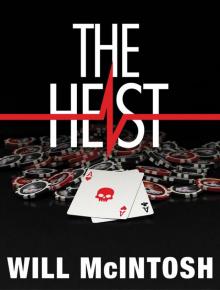 The Heist
The Heist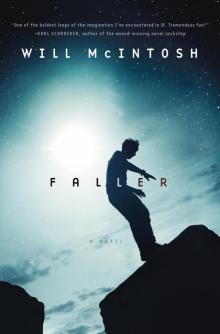 Faller
Faller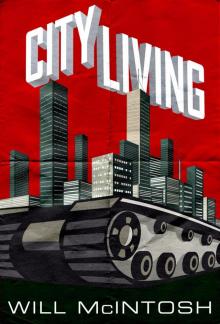 City Living
City Living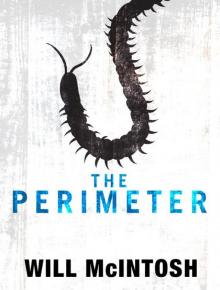 The Perimeter
The Perimeter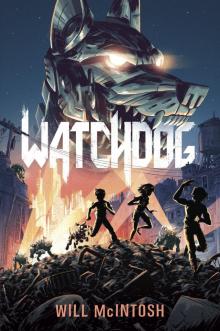 Watchdog
Watchdog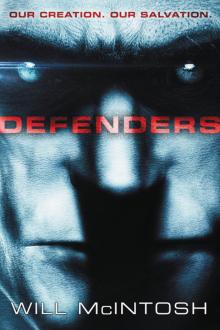 Defenders
Defenders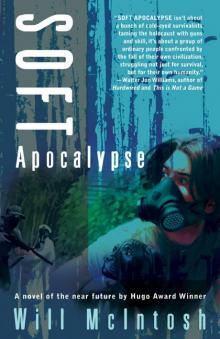 Soft Apocalypse
Soft Apocalypse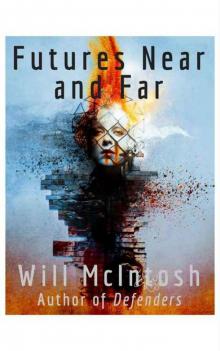 Futures Near and Far
Futures Near and Far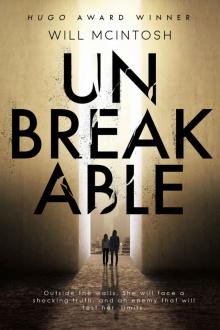 Unbreakable
Unbreakable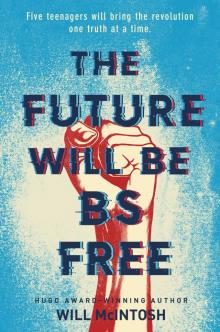 The Future Will Be BS Free
The Future Will Be BS Free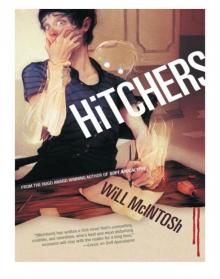 Hitchers
Hitchers Burning Midnight
Burning Midnight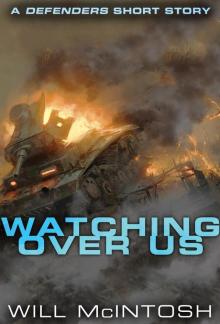 Watching Over Us
Watching Over Us